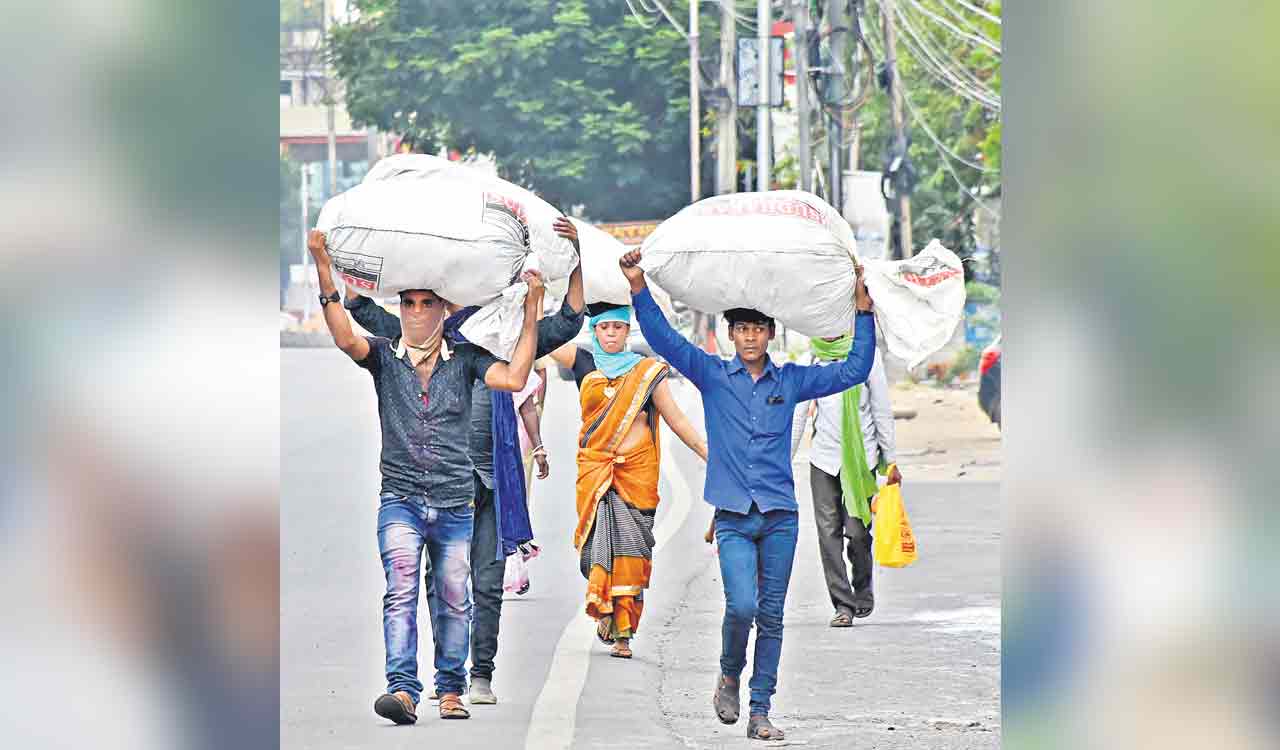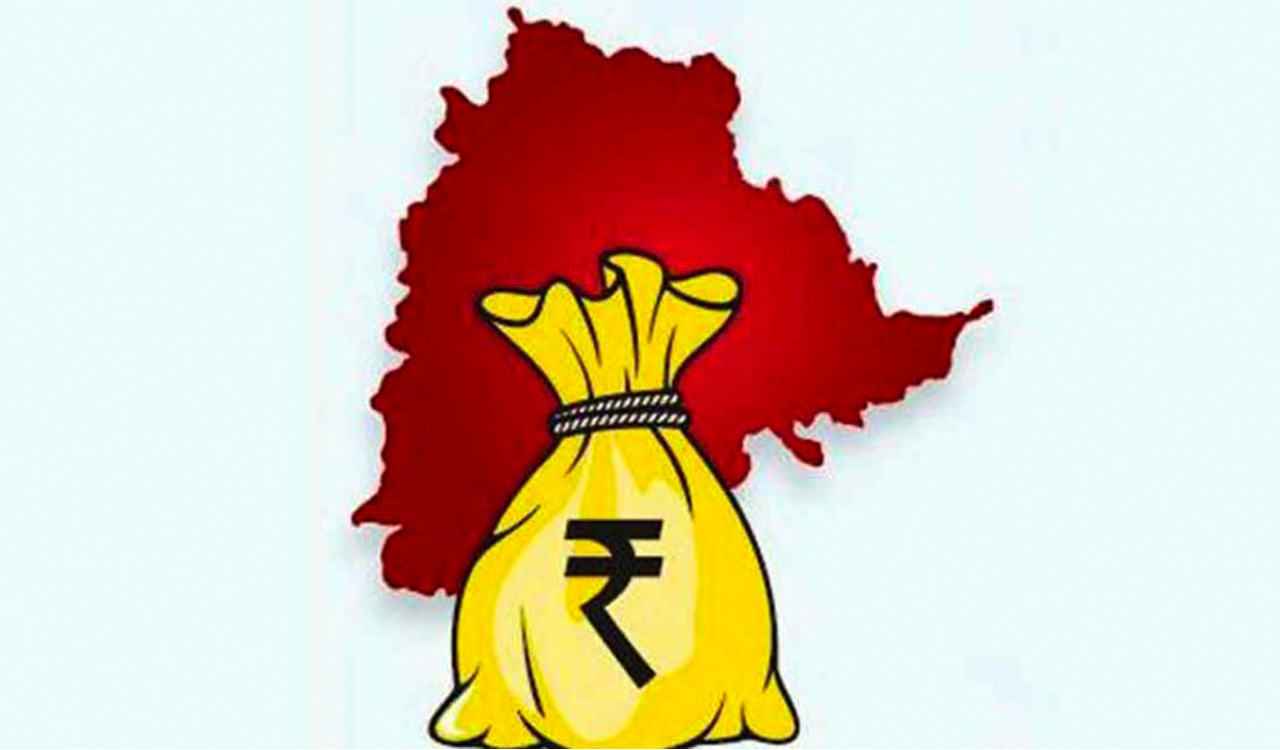Rewind: March of migrant workers
This month brings back the dreadful memory of lockdown when migrant workers’ resilience was tested and they were ‘dying’ to go home

By Sujit Kumar Mishra, Gujjeti Anudeep
Hyderabad: The unorganised labour market, which provides work throughout the year, is the largest provider of employment and livelihood for the people of India, and Telangana is no exception. The sector can be broadly divided into two parts. One is the informal enterprises, which are “either owned by individuals or households operated on a proprietary or partnership basis and with less than ten total workers.” This categorisation is based on the employment size of the enterprise.
The other is the informal workforce. According to the National Commission for Enterprises in Unorganized Sector, informal workers are those “working in the unorganised enterprises or households, excluding regular workers with social security benefits, and the workers in the formal sector without any employment benefits/social security provided by the employers.” This categorisation is based on whether a worker falls under any social security net or not.
Informal Lifeline
The sheer size of the informal sector can be understood by the amount of workforce it absorbs. According to Economic Survey 2021-22, of the additional workers which joined in 2019-20, around 90% joined the informal sector. The different categories of livelihoods falling under the informal sector are the construction industry, hospitality, gig economy, migrants, temporary jobs associated with occasions — eg, students working during Diwali and Ganesh Puja, and idolmakers. Others include vegetable vendors, breakfast vendors, tea sellers, domestic help, brick kiln workers, cooks, caretakers and security staff. The main indicator that differentiates employment in the informal sector from that of the formal sector is basically access or easy entry to the former.
In Telangana, a large number of people earn their livelihood during festivals such as Ganesh Puja, Ramzan, Diwali and Bathukamma. Apart from calling for celebrations, these festivals provide a livelihood to thousands of informal workers from nearby towns and villages, and even those from outside the State (in-migrants), irrespective of their class, caste, religion or gender. We interacted with a few informal livelihood earners during the last one year.
People of Hyderabad celebrate Ganesh Puja for a period of 10 days. The immersion starts from the second day onwards, for which they need the drum-beaters apart from other things. This nine-day period is a sound source of income for these people as they get several contracts from the puja committees. On average, they earn Rs 10,000 to Rs 20,000 during these nine days depending on their experience.
Says Raju, who was selling Ganesh idol, at the Masjid Banda, Hyderabad, “It is my part-time job, I am pursuing BCom final year. I get Rs 1,000 per day. During Diwali, I work for three days and earn Rs 3,000. My friends also work in the same way to earn their pocket money”. The same goes for the hundreds of artisans who were involved in the construction of idols in Dhoolpet and Kukatpally areas of Hyderabad. “The height and size of an idol depend upon various factors. Bigger size idols, like the one in Khairatabad which is famous for its height, require more artisans, including migrants, for a large duration of time. That means hundreds of artisans work for months together to make the idol,” says an artisan of Dhoolpet.
It has been precarious for the last two years following the lockdown. “It will take us some time to come out of it,” he says. For the vendors, who come from nearby villages during festivals to exclusively sell leaves of mangoes, banana, amla, pipal, etc, and grass and forest-produced fruits, last year was quite fruitful. These vendors are largely the women of the household, who reduce the risk of offsetting the income of the spouse. “It’s a big relief for me as the money that I earn now will be spent on paying school fees, repayment of a small loan and additionally a component will go to meet daily household expenditure,” says Moinuddin, who hails from a village in Mahabubnagar district.
Another big festival celebrated by the people of Hyderabad is Ramzan — a month-long celebration — and the key actors to make this festival a success are the people involved in the supply chains of markets like local fruit vendors, petty cloth shopkeepers, shoemakers, banglemakers, weavers, tailors and their assistants, ornament sellers, embroidery saree designed by local artisans, ration shopkeepers and milk vendors. Ramzan helps these people earn double their usual earnings. “We receive more work during Ramzan. I can work for 12 hours to make my earnings double during this occasion,” says Ahmad from old city, a place known for its business during Ramzan. Ahmed is a tailor and was out of work during the pandemic.
These occasion-specific events cater to the livelihood demand of people by giving them an opportunity to earn a sizeable income within a short span of time, which they save for education, marriage and other household expenditure. Whatever they earn, they consume in different ways and are habituated to this employment cycle. The pandemic did not just disrupt economies and movement across the globe but also halted all the activities related to these festivals as following social distancing norms was nearly impossible. This, in turn, pushed those associated with such events towards unemployment and interlocked credit market.
Home Away from Home
Migrant workers also form a large subset of the unorganised workforce of the country. Various pockets of Hyderabad such as Tolichowki, Gachibowli, and bastis in the vicinity of Camelot Layout of Kondapur are home to many people from Bihar and Uttar Pradesh. The sudden declaration of lockdown made lakhs of migrant workers walk back to their native places fearing for their life and whose numbers ranged from 10 million to 80 million in India, according to various government and non-government sources.
Though the initial days were managed from their meagre savings, the extended lockdown periods left the migrants with the only option of reverse migration. Even though respective States came out with interventions to address the issue of the affected people, it was limited in terms of time, area and dimension. Telangana Chief Minister even requested, through a press meet, that all the in-migrated people should stay back and that their food and stay would be looked after during this distressing period.
One of the major reasons why States took limited action while the exodus unfolded was the unavailability of data. Even in such kind of scenario, according to Telangana Socio-Economic Outlook 2020-2021, the Telangana government took prompt action to protect the vulnerable sections of society by helping around 2 lakh migrant workers reach their destinations by operating 6,676 Telangana State Road Transport Corporation buses. Besides, with the help of district Collectors and Commissioners, the State government identified migrants and provided them with basic amenities like food, water, shelter and medical assistance, which was evident from the in-migrated households from Bihar and Uttar Pradesh in the course of our interaction at Camelot Layout.
The Telangana government disbursed financial assistance of Rs 500 each to almost 6.5 lakh migrant workers in the State. Of the total Rs 5,268 crore spent in 2020-21 towards Covid-related measures, Rs 124 crore was spent to support migrant labourers, Rs 2,628 crore went towards providing Rs 1,500 twice to all food security cardholders, including the unorganised sector workers of the State, and around Rs 1,005 crore was distributed among construction workers by the Building and Other Construction Workers Board.
The Telangana government also constructed temporary she-toilets for migrant workers and supplied emergency kits for children and migrant women. Additionally, around 2 lakh sanitary napkins were distributed to migrant workers and to women who were residing in the institutions of the State.
Institutionalising Policies
Acknowledging the importance of migrant workers, the Telangana Chief Minister even called them “partners in the development” of the State. These are, however, one-time measures which were taken to mitigate the hardships caused by the pandemic and ensuing lockdowns. There is a need to institutionalise policies for the betterment and to create safety nets for unorganised workers/migrant workers at a systemic level.
At least in the formal sectors, social security benefits of the workers came to their rescue, but the unorganised sector workers had to turn to alternative sources of income like money lenders. This is because their chance to board the boat of social security was obstructed by the unavailability/unreliability of data on unorganised workers in the economy at the State and national levels.
Covid-19 made both national and State governments wake from their slumber and work towards the enumeration of unorganised workers and migrants so as to formalise their work nature and bring them into the social security net. The e-Shram portal was established to enumerate the unorganised workers. The goal was to enumerate 380 million unorganised workers, which include migrants, street vendors, waiters, handicraftmakers, fisherfolk, domestic helpers, agricultural labour and construction workers. The portal has 28,52,44,428 registrations. Among this, the majority, 52.8%, are women, whereas 47.2% are men, and almost 61% belong to the age group of 18-40 years of age. Around 40,40,397 were registered from Telangana on the e-Shram portal, and a majority (25,10,186) of them are from the agricultural sector.
These numbers are bound to change on a daily basis as the enumeration is an ongoing process. But one of the major drawbacks of this enumeration process is the lack of disaggregated data available on the vertical of migration. Moreover, it is unclear whether States would get the details of migrants from the e-Shram portal. The unavailability of migrants’ data State-wise would adversely affect the implementation of welfare policies for the most vulnerable section of society. In this particular case, the responsibility can be evenly shared by the Centre and the States.
Telangana was one of the first States to come out with a draft migrant worker policy in 2021 — yet to be finalised — and also started the process of enumerating migrant workers in the State from the time of Covid-19. In a federal structure, both the Central and State governments have equal responsibility towards labour welfare by bringing a coherent policy towards addressing the concerns of unorganised workers/migrant workers, and also to formulate a nuanced and fast framework for enumeration of unorganised/migrant workers, which would, in turn, help bring them into the development agenda of States.
The informal workers have now returned to their usual activities, though they were subjected to the asymmetry of information about the market which many a time led to the distress sale of their product. The dominant emotion of fear, reflective of the lost confidence emanating from the external shock about the market, was summed up beautifully by a woman vendor: “The economy is gradually coming out of the bondage of corona where people are in the process of recovering from the lost confidence of the virologic uncertainties, but we will take much more time to come out from the economic bondage emerged because of this event, expecting normal years now onwards”.
Though the State government has been constantly making efforts to address the concerns of informal livelihood earners, addressing the issues, especially the lack of data and proper institutional mechanisms, would enable these workers to fight any future external shocks with an enhanced capacity.
(Sujit Kumar Mishra is Professor, Council for Social Development [an institute of ICSSR, Government of Telangana and Reserve Bank of India], Rajendranagar, Hyderabad. Gujjeti Anudeep is Research Associate at the Institute and Research Scholar, Department of Political Science, University of Hyderabad)
Related News
-
Telangana HC hears plea over alleged extortion bid to withdraw PIL
6 hours ago -
Telangana HC quashes cases against Osmania University Arts College principal
6 hours ago -
Telangana to train 800 farmers as vegetable cultivation volunteers
6 hours ago -
Telangana CEO steps up training for officials ahead of April electoral roll revision
6 hours ago -
Manthani Sub-Registrar, document writer caught taking bribe
6 hours ago -
Four-day State-level archery competitions begin in Khammam
6 hours ago -
Jakub Mensik stuns Jannik Sinner to set up semi-final with Fils
7 hours ago -
Three court staffers held in Bhupalpally bribery case
7 hours ago




